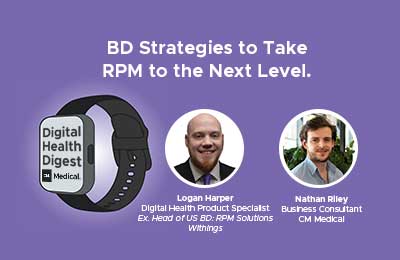

Solving a Behavioural Health Crisis.
I don’t know about you, but COVID-19 has disrupted my behaviour. I'm not eating, drinking or excercising anything like I used to. It seems that the rest of the world is having similar issues, with global behavioural health at an all-time low.
What's most concerning about this behavioural health crisis, is that many people are not receiving care. Of the one in five Americans that have behavioural health issues, less than 30% seek treatment.
Why are People Not Receiving Care?
There are many reasons why people don’t get treatment. For one, there’s a general lack of knowledge about available behavioural health services, like mental health and psychiatric treatments, as well as different types of counselling.
Even with patients that are aware of treatments, not all seek care due to a stigma around mental health issues. Many people are still afraid to admit that they need help.
That’s not all. In the past, a global shortage of mental health professionals has also meant that people can’t receive the care that they need.
In the UK, for many areas of healthcare like acute care and inpatient care, the number of mental health nurses has fallen by more than 6,000 in the last decade. Similar shortages are evident in US healthcare too.
Add COVID-19 to this mixing bowl of healthcare issues and the outlook could seem pretty bleak for the many behavioural health patients who are left isolated around the world.
However, in the last six months, telehealth has stepped into the spotlight. Its many digital solutions have helped increase behavioural health visits by nearly 50%.
Embracing Digital Behavioural Health
While behavioural healthcare providers were cautious to adopt telehealth and virtual care technologies because of concerns they wouldn’t be as effective as face-to-face appointments, COVID-19 left companies with no choice but to embrace them. So, over 80% of providers began using telehealth for the first time during the pandemic.
This marriage of behavioural health and telehealth makes sense. It solves many of the space’s major challenges.
Already, going digital has helped alleviate the widespread shortage of mental healthcare professionals and made health services more accessible for patients.
Telehealth has also helped patients avoid stigma and receive treatment from the privacy of their own homes, meaning less cases have gone untreated.
In the last six months, many studies have proven digital therapy to be equally effective as in-person treatment too. Here’s an example from the University of Alberta.
Technologies Supporting Behavioural Health
Multiple providers of digital behavioural health services have used the COVID-19 crisis as a platform to showcase the advantages of their existing technologies. This includes MDLive which has seen a huge surge in demand for its behavioural health solutions.
At the start of the pandemic, the company increased its behavioural health footprint to 34.6 million members. It also expanded its national provider network of board-certified psychiatrists and licensed therapists by 50% to meet the increased in demand.
MDLive isn’t alone in this space. Having received $16m in series B funding, SilverCloud Health is also helping meet patient demand with its world leading digital mental health platform.
The increased funding has helped SilverCloud Health enhance its range of therapy and further develop its innovative approaches to therapy, addressing a range of psychological conditions across all age groups and reaching patients on a global scale.
Meanwhile, New York-based Happify, a digital provider of gamified positive psychology, CBT and mindfulness programmes responded to COVID-19 with Happify Connect.
This screening and referral hub is used by employers and health plan providers as a way to offer access to mental health support from home, so isolated employees and members can get support at the right time.
Talkspace is also based in New-York. Its therapy platform allows users to connect with a licensed therapist from the palm of their hand.
The company has released a new digital Employee Assistance Programme (EAP) so businesses can connect staff with support on a range of topics including mental health, financial health and even legal advice.
In response to the pandemic, Talkspace is also offering thousands of free subscriptions to healthcare workers and first responders, as well as discounted subscriptions for everyone else.
BigHealth is another company going out of its way to support behavioural health globally. The company has a diverse range of digitally therapeutic products, which it’s offered to companies and all NHS staff in the UK at zero cost during the COVID-19 crisis.
There are many other companies providing crucial support in this space including Lyra Health, Ginger and Calm. You can read about some of them in this article by our Associate Director, Dan Spencer.
This Is Only the Beginning
While its important to acknowledge that digital therapy isn’t for everyone and that there’ll still be a demand for face-to-face appointments post-pandemic; it’s impossible to ignore the benefits that digital behavioural health provides.
The COVID-19 behavioural health crisis has shone a spotlight on this technology and given it the platform to prove itself. In doing so, the behavioural health space has undergone a revolution that will change patients' lives and provide greater support for people's mental health.
As the technology and its providers continue to cement their value, I expect to see even more innovation from them as they continue to support their patients' needs.
If you'd like to discuss this technology with me more or talk about the recruitment service that CM Medical offer, then please email me at james.moore@medical-cm.com.
Recommended.

Digital Health Digest: Using AI to Engage Patients and Fill Prescriptions.
Harris speaks with Nick Desai, founder of Renee, the first AI-driven personal health assistant for seniors. Nick shares insight into the platform's fascinating founding story, including gaining investment from Lionel Richie & Matt Damon. Listen now.
.jpg)
Digital Health Digest: Incentivising Exercise to Empower Employees.
In this episode, James speaks with Toby Cannon, an innovative young entrepreneur putting fitness in the workplace first with his company, Myles Wellbeing. An app changing the mindsets of desk-bound employees. Listen now.

Australian MedTech & Digital Health Start-Ups To Watch.
It’s an exciting and innovative time for Australian MedTech & Digital Health start-ups - what can we learn from their strategies and successes?

Digital Health Digest: BD Strategies to Take RPM to the Next Level.
In this episode, Nathan Riley, speaks with ex. Head of US Business Development at infamous global consumer electronics giant, Withings. Listen now.
Comments.